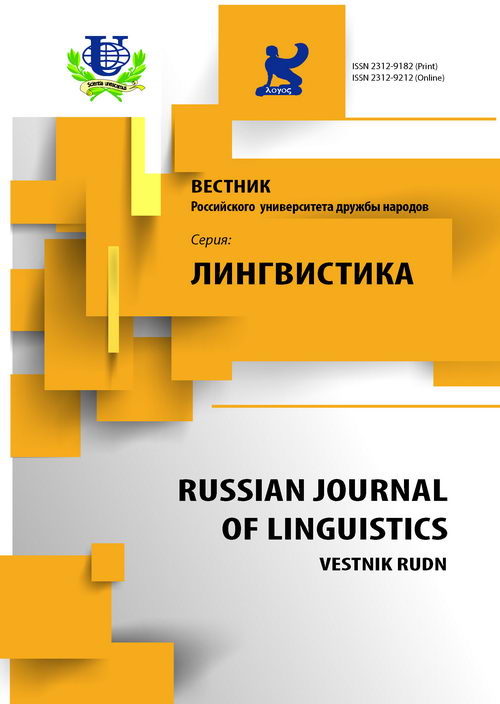№ 1 (2011)
- Год: 2011
- Статей: 20
- URL: https://journals.rudn.ru/linguistics/issue/view/588
Статьи
К вопросу интерпретации семантики фундаментальных глаголов быть и иметь
Аннотация
В статье речь идет о проблеме корреляции и дифференциации фундаментальных глаголов, рассматриваемых в качестве языковых единиц, что создает смысл в процессе их использования. Сочетание лексических и грамматических функций рассматриваемых нами глаголов связано с сосуществованием элементов их старых и новых значений.
Russian Journal of Linguistics. 2011;(1):5-10
 5-10
5-10


Особенности формирования синонимических рядов в рамках лексико-фразеологического поля
Аннотация
В статье рассматриваются особенности формирования фразеологических синонимических рядов с лексическим идентификатором в качестве доминанты ряда. Выявленные синонимические ряды отражают глубину системных языковых отношений между лексикой и фразеологией.
Russian Journal of Linguistics. 2011;(1):11-18
 11-18
11-18


Эмоционально-экспрессивные особенности глагольных идиом в русском, таджикском и английских языках
Аннотация
В статье подчеркивается важность проведения сравнительно-типологического исследования в области глагольных идиом, выражающих чувства. Основным результатом является выделение четырех основных признаков предмета исследования, проиллюстрированное примерами.
Russian Journal of Linguistics. 2011;(1):19-23
 19-23
19-23


Лингвокультурологические аспекты перевода цветообозначений с английского языка на русский
Аннотация
Статья посвящена исследованию семантики цветообозначений. Сопоставительный анализ цветов и их оттенков в переводческом аспекте на материале художественных текстов позволяет расширить знания о данной лексико-семантической группе и выявить особенности лингвистического и национального характера.
Russian Journal of Linguistics. 2011;(1):24-32
 24-32
24-32


 33-40
33-40


 41-44
41-44


Автономия личности и ее отражение в лексике и фразеологии английского языка
Аннотация
Статья посвящена одной из важнейших ценностей англосаксонской культуры - автономии личности (privacy) и ее отражению в лексике и фразеологии. Данная ценность объясняет многие особенности английского менталитета и коммуникативного поведения.
Russian Journal of Linguistics. 2011;(1):45-51
 45-51
45-51


 52-61
52-61


Метафорическая концептуализация количественного параметра потребляемой пищи во французской фразеологии
Аннотация
В работе путем анализа культурного компонента значения фразеологических единиц французского языка выявляются сведения об исторических фактах и социальных преобразованиях, затрагивающих количественный параметр потребляемой пищи в культуре французского застолья.
Russian Journal of Linguistics. 2011;(1):62-66
 62-66
62-66


Лексико-семантические особенности звукоподражательных глаголов на -Да- // -Де- в карачаево-балкарском языке
Аннотация
Статья посвящена исследованию аффикса звукоподражательных глаголов -да- // -де- в карачаево-балкарском языке. В ней рассматриваются такие вопросы, как история происхождения аффикса, семантическая классификация деривационных единиц, аффиксация и лексикализация как способы образования новых лексических единиц.
Russian Journal of Linguistics. 2011;(1):67-76
 67-76
67-76


 77-82
77-82


Соматические средства характеристики человека во французском арго (на материале фразео-тематической группы «Характер человека»)
Аннотация
В настоящей статье раскрывается специфика функционирования соматизмов в составе характерологических арготических единиц французского языка, составляющих фразео-тематическую группу «Характер человека». Особое внимание уделяется анализу образной и символьной основ соматизмов в составе рассматриваемых фразеологизмов. При изучении структурно-семантических особенностей исследуемых единиц отдельное место занимает рассмотрение субституции и интенсификации.
Russian Journal of Linguistics. 2011;(1):83-90
 83-90
83-90


К вопросу изучения cпецифики эмоционального состояния (на примере французских произведений конца XX-XXI в.)
Аннотация
В данной статье рассматриваются психологические и лингвистические подходы к изучению эмоций, к описанию эмоциональных состояний. Автором на примере французского языка разбираются такие виды эмоциональных переживаний, как настроение, эмоция, чувство, аффект, страсть, а также приводится классификация эмоционального состояния.
Russian Journal of Linguistics. 2011;(1):91-95
 91-95
91-95


Работа со словарем и учебное комментирование в преподавании иностранного языка вне языковой среды
Аннотация
В статье рассматриваются проблемы обучения русскому языку мексиканских студентов вне языковой среды, связанные с лингвистическими и культурологическими трудностями; приводятся конкретные примеры из опыта преподавания автора в таких аспектах, как работа со словарем в аудитории и учебное комментирование.
Russian Journal of Linguistics. 2011;(1):96-104
 96-104
96-104


Повторы в немецкоязычной рекламе - речевые действия, способствующие реализации стратегии рекламодателя
Аннотация
В статье рассматривается предположение, что синтаксические единицы, находящиеся в аналогичных позициях, воздействуя на подсознание потенциального потребителя, могут трансформироваться в эмоциональные образы в соответствии со скрытой стратегией манипулятивного воздействия рекламодателя.
Russian Journal of Linguistics. 2011;(1):105-111
 105-111
105-111


 112-115
112-115


Семиотика пространства в прозе Х. Кортасара
Аннотация
Статья посвящена рассмотрению моделей пространства в тексте романа Х. Кортасара «Игра в классики» и установлению аналогии между основными моделями пространства и структурой текста романа. Семиотически значимые модели и элементы пространственных отношений отражены в лексемах, которые приобретают символическое значение, не утрачивая прямого смысла.
Russian Journal of Linguistics. 2011;(1):116-121
 116-121
116-121


Художественный текст как объект концептуального анализа
Аннотация
Статья посвящена проблеме исследования концептуального пространства художественного текста как источника лингвокульторологической информации. Рассматриваются некоторые типы национально-специфических концептов, составляющих концептосферу национального языка.
Russian Journal of Linguistics. 2011;(1):122-126
 122-126
122-126


Основные направления исследований текстологических проблем, проведенных молодыми учеными России
Аннотация
Статья посвящена анализу кадрового потенциала в России в области текстологии на основе обобщения исследований, представленных молодыми учеными в рамках работы Всероссийской научной школы для молодежи «Текстология сегодня: итоги, проблемы, методы» 8-20 ноября 2010 г., Москва, РУДН.
Russian Journal of Linguistics. 2011;(1):127-134
 127-134
127-134


Наши авторы
Russian Journal of Linguistics. 2011;(1):135-136
 135-136
135-136
















